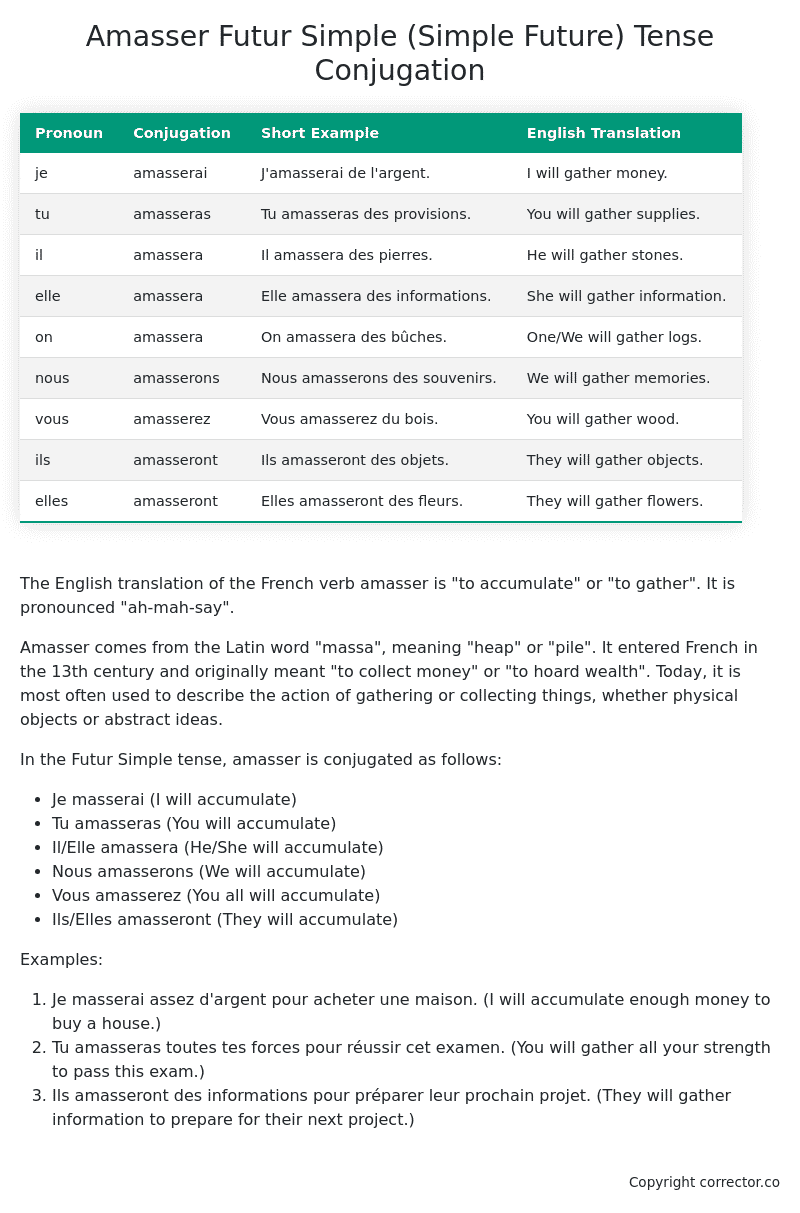Futur Simple (Simple Future) Tense Conjugation of the French Verb amasser
Introduction to the verb amasser
The English translation of the French verb amasser is “to accumulate” or “to gather”. It is pronounced “ah-mah-say”.
Amasser comes from the Latin word “massa”, meaning “heap” or “pile”. It entered French in the 13th century and originally meant “to collect money” or “to hoard wealth”. Today, it is most often used to describe the action of gathering or collecting things, whether physical objects or abstract ideas.
In the Futur Simple tense, amasser is conjugated as follows:
- Je masserai (I will accumulate)
- Tu amasseras (You will accumulate)
- Il/Elle amassera (He/She will accumulate)
- Nous amasserons (We will accumulate)
- Vous amasserez (You all will accumulate)
- Ils/Elles amasseront (They will accumulate)
Examples:
- Je masserai assez d’argent pour acheter une maison. (I will accumulate enough money to buy a house.)
- Tu amasseras toutes tes forces pour réussir cet examen. (You will gather all your strength to pass this exam.)
- Ils amasseront des informations pour préparer leur prochain projet. (They will gather information to prepare for their next project.)
Table of the Futur Simple (Simple Future) Tense Conjugation of amasser
| Pronoun | Conjugation | Short Example | English Translation |
|---|---|---|---|
| je | amasserai | J’amasserai de l’argent. | I will gather money. |
| tu | amasseras | Tu amasseras des provisions. | You will gather supplies. |
| il | amassera | Il amassera des pierres. | He will gather stones. |
| elle | amassera | Elle amassera des informations. | She will gather information. |
| on | amassera | On amassera des bûches. | One/We will gather logs. |
| nous | amasserons | Nous amasserons des souvenirs. | We will gather memories. |
| vous | amasserez | Vous amasserez du bois. | You will gather wood. |
| ils | amasseront | Ils amasseront des objets. | They will gather objects. |
| elles | amasseront | Elles amasseront des fleurs. | They will gather flowers. |
Other Conjugations for Amasser.
Le Present (Present Tense) Conjugation of the French Verb amasser
Imparfait (Imperfect) Tense Conjugation of the French Verb amasser
Passé Simple (Simple Past) Tense Conjugation of the French Verb amasser
Passé Composé (Present Perfect) Tense Conjugation of the French Verb amasser
Futur Simple (Simple Future) Tense Conjugation of the French Verb amasser (this article)
Futur Proche (Near Future) Tense Conjugation of the French Verb amasser
Plus-que-parfait (Pluperfect) Tense Conjugation of the French Verb amasser
Passé Antérieur (Past Anterior) Tense Conjugation of the French Verb amasser
Futur Antérieur (Future Anterior) Tense Conjugation of the French Verb amasser
Subjonctif Présent (Subjunctive Present) Tense Conjugation of the French Verb amasser
Subjonctif Passé (Subjunctive Past) Tense Conjugation of the French Verb amasser
Subjonctif Imparfait (Subjunctive Imperfect) Tense Conjugation of the French Verb amasser
Subjonctif Plus-que-parfait (Subjunctive Pluperfect) Tense Conjugation of the French Verb amasser
Conditionnel Présent (Conditional Present) Tense Conjugation of the French Verb amasser
Conditionnel Passé (Conditional Past) Tense Conjugation of the French Verb amasser
L’impératif Présent (Imperative Present) Tense Conjugation of the French Verb amasser
L’infinitif Présent (Infinitive Present) Tense Conjugation of the French Verb amasser
Struggling with French verbs or the language in general? Why not use our free French Grammar Checker – no registration required!
Get a FREE Download Study Sheet of this Conjugation 🔥
Simply right click the image below, click “save image” and get your free reference for the amasser Futur Simple tense conjugation!

Amasser – About the French Futur Simple (Simple Future) Tense
Formation of Futur Simple
For regular -er verbs (e.g., parler – to speak)
For regular -ir verbs (e.g., finir – to finish)
For regular -re verbs (e.g., vendre – to sell)
Common Everyday Usage Patterns
Conditional Statements
Interactions with Other Tenses
Futur Antérieur
Conditional
Present
Summary
I hope you enjoyed this article on the verb amasser. Still in a learning mood? Check out another TOTALLY random French verb conjugation!


